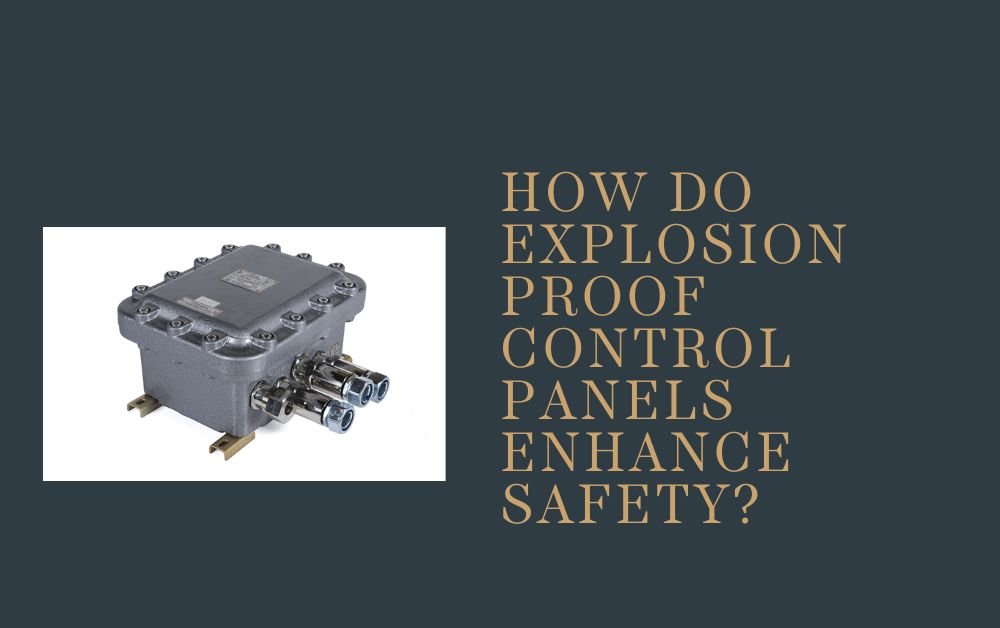One of the crucial components that contribute to safety in hazardous environments is the explosion-proof control panel. These panels are designed to protect equipment and personnel from the risks associated with explosive atmospheres. In this blog, we will explore how explosion-proof control panels enhance safety, their design features, benefits, and applications in various industries.
Understanding Explosion-Proof Control Panels
What Are Explosion-Proof Control Panels?
Explosion-proof control panels are electrical enclosures designed to prevent the ignition of explosive gases, vapors, or dust that may exist in certain environments. These panels contain electrical components, such as switches, relays, and circuit breakers, which are housed in a robust enclosure. The design ensures that any internal explosion does not spread to the external environment.
Why Are They Necessary?
In industries like oil and gas, chemical manufacturing, and mining, the presence of flammable materials is common. A single spark from faulty electrical equipment can lead to catastrophic explosions. Explosion-proof control panels provide an essential layer of protection, reducing the risk of accidents and ensuring the safety of workers and facilities.
Key Features of Explosion-Proof Control Panels
1. Durable Construction
Explosion-proof control panels are made from robust materials such as stainless steel or aluminum. These materials can withstand harsh environmental conditions, including extreme temperatures and corrosive substances. The durable construction protects the internal components from damage, ensuring long-term reliability.
2. Sealed Enclosures
The enclosures of explosion-proof control panels are tightly sealed to prevent the entry of gases, dust, or moisture. This sealing minimizes the risk of ignition from sparks or overheating. Proper sealing also protects the components from environmental factors, increasing their lifespan.
3. Internal Pressure Relief
In case of an internal explosion, explosion-proof control panels are designed to manage the pressure buildup. They feature pressure relief mechanisms that allow gases to escape safely without causing damage to the enclosure. This feature is crucial in preventing explosions from spreading to the surrounding area.
4. Certification Standards
Explosion-proof control panels must meet strict industry standards and certifications. These standards ensure that the panels can safely operate in hazardous environments. Certification agencies, such as Underwriters Laboratories (UL) and the International Electrotechnical Commission (IEC), assess and verify the safety features of these panels.
Benefits of Using Explosion-Proof Control Panels
1. Enhanced Safety for Workers
The primary benefit of explosion-proof control panels is the enhanced safety they provide for workers. By preventing explosions, these panels protect employees from potential harm. In industries where workers are exposed to hazardous conditions, such safety measures are essential for maintaining a secure work environment.
2. Reduced Risk of Equipment Damage
Explosions can cause significant damage to machinery and equipment. Explosion-proof control panels help minimize this risk by containing potential explosions and preventing them from spreading. This protection extends the life of the equipment, reducing maintenance and replacement costs.
3. Compliance with Regulations
Many industries are governed by strict safety regulations that require the use of explosion-proof equipment in hazardous environments. By implementing explosion-proof control panels, companies can comply with these regulations, avoiding penalties and legal issues. Compliance also demonstrates a commitment to safety, enhancing the company’s reputation.
4. Increased Operational Efficiency
By ensuring a safer working environment, explosion-proof control panels contribute to increased operational efficiency. When workers feel secure, they can focus on their tasks without worrying about potential hazards. This focus leads to improved productivity and performance.
Applications of Explosion-Proof Control Panels
1. Oil and Gas Industry
The oil and gas industry operates in environments with a high risk of explosive gases. Explosion-proof control panels are used in drilling rigs, refineries, and gas processing facilities. They help monitor and control processes while ensuring the safety of workers.
2. Chemical Manufacturing
Chemical plants often handle volatile substances that can create explosive atmospheres. Explosion-proof control panels are essential in these facilities to manage electrical systems safely. They are used in areas where chemicals are stored or processed.
3. Mining Operations
In mining operations, the presence of dust and gases can pose significant hazards. Explosion-proof control panels are used in equipment such as conveyor systems and ventilation controls. These panels enhance safety while ensuring the efficient operation of mining equipment.
4. Pharmaceuticals
Pharmaceutical manufacturing often involves the use of flammable solvents and materials. Explosion-proof control panels are employed in these facilities to protect electrical systems and ensure the safety of processes. Their use is crucial in maintaining product integrity and worker safety.
Choosing the Right Explosion-Proof Control Panel
1. Assessing Your Needs
Before selecting an explosion-proof control panel, it’s essential to assess your specific needs. Consider the environment where the panel will be installed, the types of materials handled, and the level of risk associated with the operation. This assessment will help you choose a panel that meets your safety requirements.
2. Consulting with Experts
Consulting with industry experts or suppliers can provide valuable insights into the best explosion-proof control panels for your applications. They can guide you in selecting panels that comply with regulations and meet industry standards.
3. Regular Maintenance and Inspection
To ensure the continued safety of explosion-proof control panels, regular maintenance and inspection are crucial. Periodic checks can identify potential issues before they escalate, ensuring that the panels operate effectively and safely.
Conclusion
Explosion-proof control panels play a vital role in enhancing safety in hazardous environments. Their durable construction, sealed enclosures, and compliance with strict standards help prevent catastrophic incidents caused by explosive gases or dust. By investing in these panels, industries can protect their workers, equipment, and overall operations.
In a world where safety is paramount, understanding the importance of explosion-proof control panels is crucial for any industry dealing with hazardous materials. They not only enhance safety but also promote a culture of care and responsibility towards workers and the environment. As technology continues to advance, the development of even more efficient and reliable explosion-proof control panels will contribute to safer industrial practices in the future.
Note :- To read more articles visit on empireadda.



